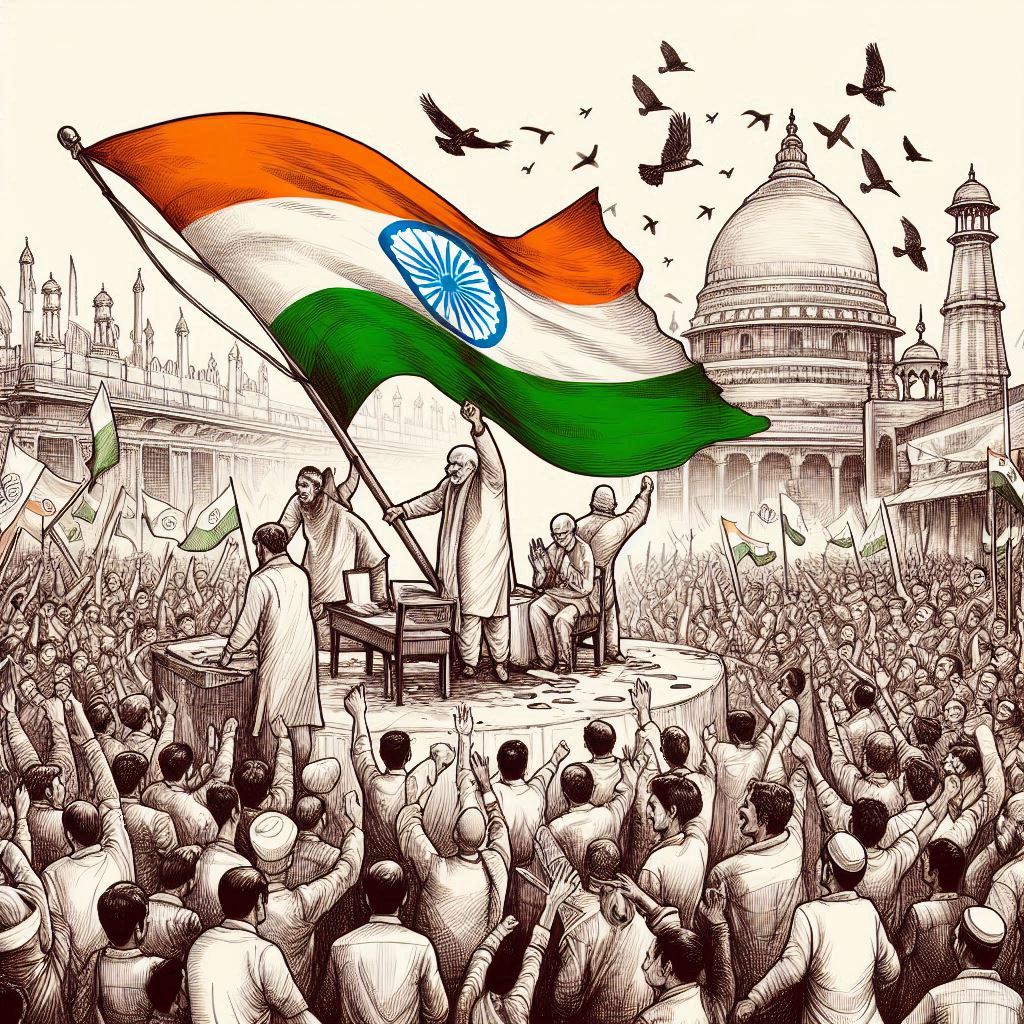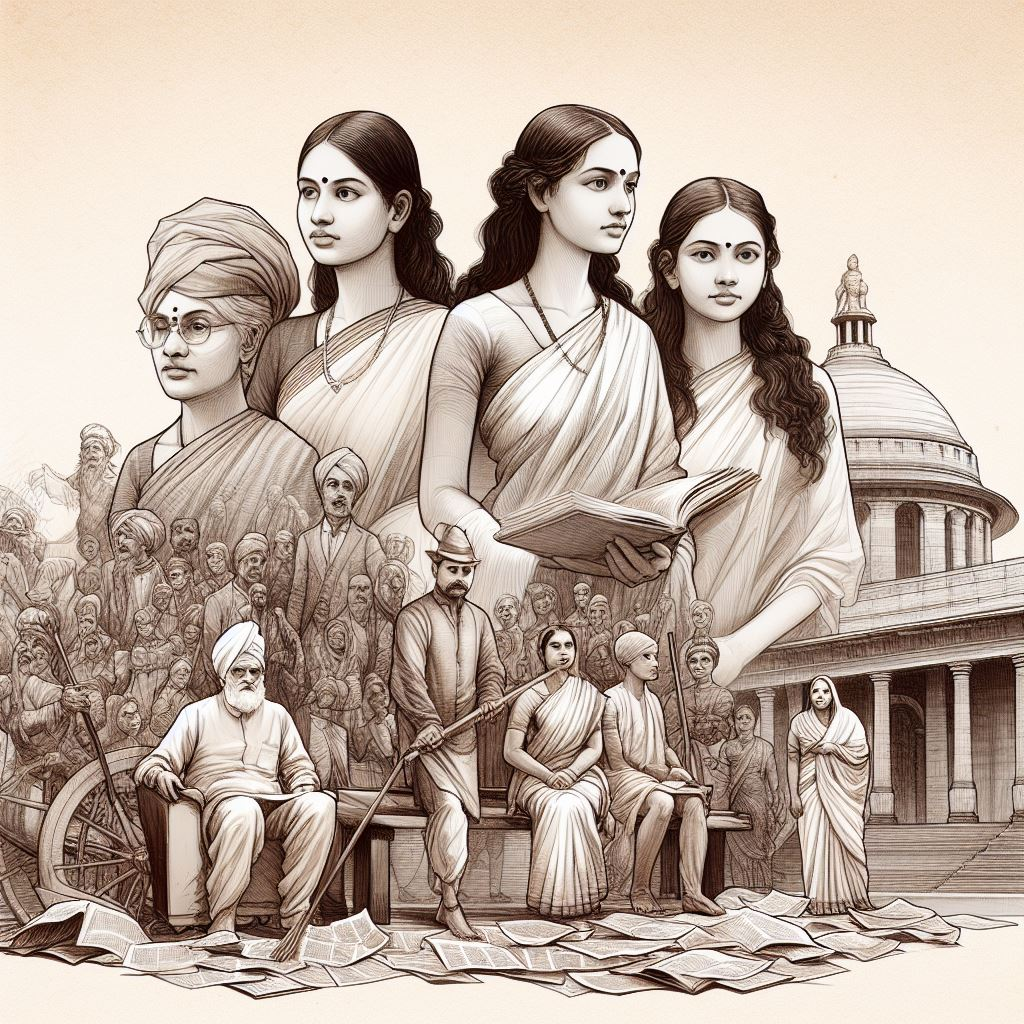Faheem Farooq
‘’THE DAY THE POWER OF LOVE OVERRULES THE LOVE OF POWER, THE WORLD WILL KNOW PEACE’’
-MAHATMA GANDHI
The socio-economic polity of the country has exposed the fallacy of the “ABKI BAAR 400 PAAR’’ narrative. For an incumbent administration to stand intact, it must not confuse the concept of growth with the idea of “just and fair’’ development for all.

In recent Lok Sabha elections, the verdict of people’s choice gave a vivid message to the ruling government: that it must not forget its own doctrine of “SABKA SAATH, SABKA VIKAS, SABKA VISHWAS’’ which advocates the philosophy of taking the masses together towards the highway of ‘’Inclusive growth and development’’, for the sake of the prosperity of the whole nation. The BHARTIYA JANTA PARTY, which secured a landslide victory in the general elections of 2014 and 2019, solitarily won 303 seats out of 54 seats in 2019, while it just needed a mark of 272 to be in the majority. But this time, the elephant political party fell short, giving room to coalition politics to re- enter the administration of democratic India. However, the little success of the idea so propounded of “development of all’’ did not yield fruitful results for the government itself, especially in rural areas, which came forward as a setback for the current largest political party in India to even secure a majority on its own for the formation of the government. The said party only accounted for 240 seats out of 543, which is a fiasco indeed!
WINNING BUT NOT WINNING!
The fact is that the National Democratic Alliance [NDA] is forming a coalition government in 2024. Modi 3.0 is in its launching, but the political atmosphere does not construe it as “winning in the true sense’’ but sees it as “KNEELING OF THE MIGHTIEST’’. It turned out the verbatim of India’s Home Minister has failed on test. It was said, “In political science, public support does not have a reverse gear. It always goes forward’’. However, the reality now is the opposite: public support has shown a down trend, the seat share of the mighty political party of India has been reduced to less than a majority, and it has been cut down to size. There are innumerable reasons for the reduction of the seat-share of the said party, ranging from fear of alteration in the Grundnorm [Constitution] in its third term to caste, religious, and economic factors.
HOW ECONOMY DOWNPLAYED THE LOTUS PARTY?
Currently, India is the fastest growing economy especially after its recovery from the COVID-19 era which lead to the recession in the economy and meanwhile, in no time the dream of becoming a 5 trillion-dollar economy will be materialized. It must be noted that India saw a growth of real GDP at a pace of 9.7 per cent, 7 per cent, 8.2 per cent in last three years. PHENOMENAL! This in no way should be detrimental towards the incumbent administration. But why did not these lofty numbers help the government to be successfully re-established through the 2024 general elections? BIZARRE!
HERE IS WHY!
At first, the GDP measurement is itself full of faults, and corrections are indispensable. It does not depict the true picture of the state of the Indian economy. Failure to deflate inputs, feeble measurements, and ignorance towards true ‘’social wellbeing’’ indicators are the grim realities of gauging the economy. Moreover, the achieved growth is not unreal. There is no doubt that the economy has grown and the graph of output is soaring, but the concern is that the benefits of the growth are not being catapulted towards the weaker sections of society. As mentioned earlier, the government must not at any cost confuse the doctrine of growth with that of development, which is not just development but actually ‘’just and fair’’ development that expands towards each and every stratum of society—the true sense of the ‘’SABKA SAATH, SABKA VIKAS, SABKA VISHWAS’’ model.
Besides, the growth we see is unbalanced, meaning the ‘’sun of development’’ does not cast its shadow all over India equitably but somehow sets discriminatory as if the formal sector lies near the equator and the informal sector at the poles. The administration of India had envisioned a V-shaped recovery post-COVID, which ended up being a K- shaped recovery. IRONY! Deep down, it has hurt the expectations of the ruling
government in the electoral process this year.
BUT WHERE DID IT HURT THE MOST?
The answer is rural India; the tally of the lotus party constituencies in rural areas went down drastically. The party lost most of the seats here! The numbers saw a downfall in rural constituencies where the BJP used to exercise hegemony in electoral processes. For instance, the tally came down from 253 in 2019 to 193 in 2024. The plummet has led to the loss of approximately 60 seats. A BIG NUMBER! However, the government cannot be blamed, as if it has ignored rural areas completely. The efforts and policies of the government to elevate the weaker sections of the downtrodden class were not untrue but lacked strength and vigor. The Modi 2.0 mandate brought commendable changes via its policies in rural India, ranging from building houses, toilets, and whole infrastructure to safe portable drinking water. Despite these efforts and high GDP growth, the poor fellows of rural parts of India did not see any hike in their income levels. Even adjusted for inflation, the average rural family’s income is not above Rs 20,000 per month. Real wages remain constantly low in rural areas.
From all the sectors, the agricultural sector is doing pathetic, not to be neglected; it is the sector upon which a significant portion of India’s population is relying, not to say the majority of the population. However, its contribution to overall GDP is very low; as per the estimation of the Ministry of Statistics and Programme Implementation, the growth in agricultural GDP was just 1.4 percent in 2023–24 (FY24). Additionally, the percentage of the workforce participating in agriculture accounts for almost 46%.
Now imagine the quality of life being enjoyed at such a low growth rate, making it a plausible factor in the downfall of the lotus party’s seat share in rural parts of the country. Therefore, due attention must be given to the agri-community of India, and the income levels must be raised substantially. Also, the rise in inflation has shown a reduction in average rural consumption in India. The data from NielsenIQ has shown the following as consumption indexes:
Quarter 3, 2021; – 2.9%
Quarter 4, 20211; – 2.6%
Quarter 1, 2022; – 5.3%
Quarter 2, 2022; – 2.4%
Quarter 3, 2022; – 3.6%
Quarter 4, 2022; – 2.8%
Quarter 1, 2023; – 0.3%
Quarter 2, 2023; – 4%
Such consumption data was negative until Quarter 1 of FY 2023. Moreover, CPI [Consumer Price Index] data reveals that rural inflation has been higher than urban areas.
Lastly, the acting government faced the music for causing an uproar amongst the farmers through farmer’s protests in 2020, 2021, and 2024 upon the passing of new farm laws and MSP [Minimum Support Price] demands. For instance, the ruling party was not able to win even a single seat in the state of Punjab. The ramifications of somehow ignoring the rural parts of India had taken a toll on the lotus party’s ability to perform exceptionally in the 2024 general elections.
FROM ABKI BAAR 400 PAAR TO ABKI BAAR PYAAR HE PYAAR
Since the failure of exit polls predicting a swift victory of the BJP, flooded with retorts of ‘ABKI BAAR PYAAR HE PYAAR’ as a response to the dictum of ‘ABKI BAAR 400 PAAR’. However, all these adages will not help or support India to grow holistically, but they prove to be a hampering and obstructive instrument for realizing the true prosperity of all and only end up creating lacunae that boost polarization and division in society.
Electoral processes have always testified that governments keep coming and going; enthronement and dethronement are part of it, as politics is all dynamic, but what has remained static is the dilapidated condition of the poor masses, particularly in the agricultural sector, since India awakened to freedom 77 years ago.
These results of the 2024 general elections act as an intimation, encapsulating a high time for the incumbent administration to understand that making points about the state of an economy and, through these points, defying poverty throughout, is the true NIRVANA.
The views and opinions expressed by the author in this article are his personal opinions and do not represent the views of PureSociology. You can contact the author/s at [email protected]. The details of the author:
Mr. Faheem Farooq is a Law student (BALLB ) at Chandigarh University (CU), Punjab (India).



Good read , well articulated and documented
How will the 2024 election results affect the dynamics of electoral politics in India?
Regard Telkom University